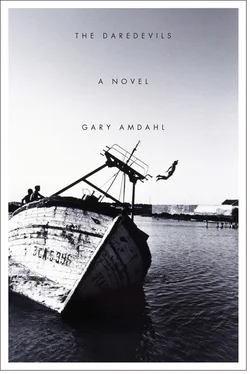Charles became entangled in the phrase: some goddamn teetotaler will burn it down, and Vera remarked the vacancy of his face by snapping her fingers in front of it. He mumbled what he’d been thinking, and that he had never been able to sleep on trains, and that travel was deranging even in the best circumstances, then finished the thought: The sheriff, decried in the only state-approved newspaper in town — there had been two others but they had been shut down by a senator, or rather by his friends on the MCPS, after editors of the newspapers under scrutiny had refused to stop running stories critical of the senator — as a “half-breed Finn,” said he would close the saloon only if he was absolutely forced to do so. The MCPS had decided to withhold judgment until they had taken sufficient counsel, heard from everybody, deliberated carefully and thoroughly, and allowed the saloonkeepers to dig themselves more deeply into their already dark and spacious graves. We will let them fall asleep in this bed they have made for themselves up there, Triangle McGee had informed him. It’s always much more effective to beat down a bedroom door, so to speak, and haul someone squealing out of dreamland and that nice quilted comforter their grandma made for ’em.
That was where things stood, or at least had stood. Things, it was assumed, were different now that there was an NPL speaker in town.
The saloon’s back door was slightly ajar. Vera and Charles stood for a moment before it, heard voices inside, and walked in. It was quite dark. A single light hung low over a long table, and another over the bar, illuminating a man with his foot on the rail and a woman behind the bar with her arms folded. Rejean Houle stood in the darkness between the two cones of light. The two Wobblies who had come to Saint Paul to talk to Vera, Joe, and the older man whose name she had never learned sat at a table in darkness so deep they were nearly invisible.
“Morning!” Vera called out, over-brightly. The man and the woman looked over. “Are you open?”
They smiled, both man and woman, at the same time, and Vera took it as an encouragement. She walked toward them, smiling, Charles following.
“Just what I was wondering,” he said pleasantly.
“Who you all are,” said the man, “is the question.”
Charles set his bags down. “Charles Minot.”
“Pair in the front door, pair in the back. Must be a raid.”
“Ray John Howell,” said Rejean Houle.
“All right for starters,” said the man. “What do you do, Charles?”
“Friends call me Chick.”
“What do you do, Chick?”
“I have done many things.”
“You sound like an Indian, but you don’t look like one.”
“Long train ride,” said Charles, alarmingly in the manner of a vaudeville Indian. He could act and lie as recklessly as he wished. The stage was wide open. There was absolutely nothing at stake beyond the preservation of Vera’s well-being, if and when Daisy was arrested for her speech, and if and when Vera took her place. “Thirsty. We not ourselves yet.”
The woman sniffed a kind of laugh and the man smiled what appeared to all concerned to be an acknowledgement — one not lost on Charles, who heard it as applause.
“One of the many episodes of great interest and excitement in my life has been the racing of motorcycles. I was associated with a shop in San Francisco, Beveridge’s, which is where I. hail from.”
“The racing of motorcycles? You don’t say. What’s that like?”
“It get old, like everything,” said Jules.
Vera was concerned at the continuing attempt at comedy, so concerned she turned fully around and stared at him.
“What bring you here, chief?” asked the man, adopting the tone.
Charles, glancing at Vera, stepped sideways into the light. “We are inspecting the weights that the millers and the elevator people and the railroads are using.”
The woman sighed and Charles looked closely at her. Her face was more clearly lit now and his eyes had adjusted: it was the woman with the sack and she looked like Vera.
“You’re not a Kolessina, are you?” he asked, coming closer. “Family down around Muscatine, Iowa?”
“No,” said the woman incredulously. “Why?”
“You look like my associate here, don’t you agree?”
Charles tugged gently on Vera’s arm, and she came into the cone of light.
“I don’t see it,” said the woman.
“Nor do I,” said Vera.
Charles chose that moment to try a character. “We’re subcontracting with Pinkerton’s.”
The woman looked at him as if to say, I do not look like you or your associate, and you know I do not. But this was not necessarily a hostile or even a guarded look — rather a recognition that a gamble had been taken the stakes of which would not be completely and immediately reckoned, much less lost.
“Miss Kolessina is a Russian,” said Charles. “Allow me to pause provocatively here, and then put quote marks around that ‘Russian,’ for even more emphasis. She’s a RUSSIAN,” he shouted, “and she works for Pinkerton’s! What do you think about that ?”
“Darkness,” said the woman, “is on the face of the waters.”
Because he was an actor, and only because he was an actor, Charles did not flinch, or in any way betray the salience of her phrase. “What,” he asked, “have you got something against Pinkerton subcontractors?”
“What,” countered the woman, “you got something for ’em?”
“Last time I checked,” drawled Charles, “they were tracking down the godless animals who are throwing bombs into crowds of innocent people.”
The woman laughed derisively.
“Into crowds of innocent people I happened to know!” Charles was all but laughing back at the woman — or rather, with her.
“I suppose it never occurred to you that the Pinkerton gang was doing the actual throwing.?”
Now Charles laughed out loud. “Oh, it occurred to me, all right!”
He and the woman engaged in what seemed to be genuine mirth.
The man cleared his throat and returned to the subject of weights. “Better get rid of ’em all. They’re all bad, Charles.”
“Call me Chick.”
“Take my word for it, Chick. Save yourself a lot of time and money and effort and I know all about time and money and effort going down the drain. Just go down to the foundry and say, ‘Hey, I need new accurate weights for every elevator in the state of Minnesota! It’s either that or every farmer in the whole goddamned Midwest dries up and blows away!’”
“Well, sir, that’s the way we heard it too,” said Charles.
“Only way there is to hear it.”
“Can I get a drink? Big glass of water and a shot, and for—”
“Fraid not. As a representative of the state government, you ought to know better than to ask.”
“I hear you. But if I could convince you that there’s more to me than meets the eye, and that the part of me you can’t see is 100 percent in favor of your running your business twenty-four hours a day and seven days a week or however it is you feel like running it, what would you say then?”
“I would say no soap, stranger. But in the friendliest way possible.”
“Not even a glass of water and—”
The woman poured four glasses of water from a bucket and set two of them on the bar. Charles and Vera drank thirstily, even noisily. The woman took the other two into the darkness for the Wobblies. Passing Ray, she asked if he wanted one too. He said he did, and thanked her. When everybody was done, the woman filled their glasses again, spilling water from each glass onto the bar, laughing and saying “ooops” each time, picking the glass up, mopping the bar, setting the glass back down.
Читать дальше












